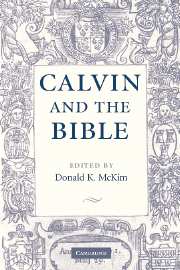Book contents
- Frontmatter
- Contents
- Notes on contributors
- Preface
- List of abbreviations
- 1 Calvin as commentator on Genesis
- 2 Calvin as commentator on the Mosaic Harmony and Joshua
- 3 Calvin as an interpreter of Job
- 4 Calvin as commentator on the Psalms
- 5 Calvin as commentator on the Prophets
- 6 Calvin as commentator on the Synoptic Gospels
- 7 Calvin as commentator on the Gospel of John
- 8 Calvin as commentator on the Acts of the Apostles
- 9 Calvin as commentator on the Pauline epistles
- 10 Calvin as commentator on Hebrews and the Catholic Epistles
- 11 John Calvin as an interpreter of the Bible
- Index
2 - Calvin as commentator on the Mosaic Harmony and Joshua
Published online by Cambridge University Press: 09 November 2009
- Frontmatter
- Contents
- Notes on contributors
- Preface
- List of abbreviations
- 1 Calvin as commentator on Genesis
- 2 Calvin as commentator on the Mosaic Harmony and Joshua
- 3 Calvin as an interpreter of Job
- 4 Calvin as commentator on the Psalms
- 5 Calvin as commentator on the Prophets
- 6 Calvin as commentator on the Synoptic Gospels
- 7 Calvin as commentator on the Gospel of John
- 8 Calvin as commentator on the Acts of the Apostles
- 9 Calvin as commentator on the Pauline epistles
- 10 Calvin as commentator on Hebrews and the Catholic Epistles
- 11 John Calvin as an interpreter of the Bible
- Index
Summary
CALVIN'S FINAL COMMENTARIES
The final two expositions of Scripture that John Calvin produced before his death were the Commentary on the Last Four Books of Moses, Arranged in the Form of a Harmony (referred to as the Mosaic Harmony) and his commentary on Joshua. The Mosaic Harmony appeared in Latin, along with Calvin's second edition of his Genesis commentary, in 1563. The next year Calvin published the French version, which he himself had translated, with minor revisions. Calvin died on May 27, 1564, but not before he had completed his commentary on Joshua. The French version appeared first, for unknown and debated reasons, followed by the Latin edition. To both of these editions Theodore Beza had added his Life of Calvin.
Thus the Mosaic Harmony and Joshua represent Calvin's exegetical work at its most mature. Calvin had consolidated his position and his program of reform in Geneva, but he was never complacent about the stability of those reforms. He continued to defend his positions to the end. His health, which had always been a problem for Calvin, was quickly declining in these last years. But there is no evidence of diminished capacity or energy in either of these final commentaries that he produced.
While most of Calvin's published interpretations of the Old Testament had originated as academic lectures, his expositions of the latter Pentateuch and Joshua were among his commentarii proper; he wrote and intended these works for publication and a wide readership.
- Type
- Chapter
- Information
- Calvin and the Bible , pp. 30 - 52Publisher: Cambridge University PressPrint publication year: 2006
- 1
- Cited by



